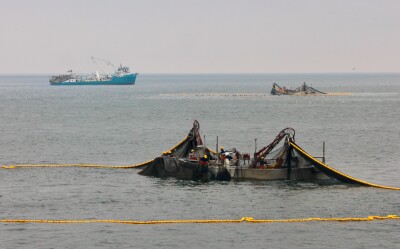Mainers are a fiercely independent bunch. And Maine lobstermen are some of the prime examples. It makes sense. Many of them spend a lot of solitary time out on the water. It can be a trying task, eking out a living on this craggy coast.
Many lobstermen have deep family history to show that it can be done. And who wants to be outdone by their ancestors?
These days, the Maine lobster fishery has a healthy resource that's relatively easy to manage and can be fished in small boats with or without a sternman.
Yes the fishery is sustainable, but is the market?
Right now, the opportunity to pass a $3 million marketing bill in the Maine statehouse is at risk as a result of industry infighting. Where it is coming from is somewhat of a mystery to the fishery's representatives, including the Maine Lobstermen's Association's Patrice McCarron, Dave Cousens and Annie Tselikis.
The approach to the marketing bill started with outreach meetings last year, which carried into a flurry of meetings in January. In all, roughly 1,600 lobstermen turned out, and the support was overwhelmingly positive.
Now after three legislative work sessions (and a fourth looming) aimed at finessing the bill that would bring this marketing effort to life, the prospects are looking shaky. And it all comes down to what percentage the lobstermen and the processors are going to pay.
The bill was written with a 75-25 split between harvesters and processors. The Maine Lobstermen's Association is looking at a possible 60-40 split, and the Maryland-based union International Association of Machinists and Aerospace Workers is suddenly representing a small pool of lobstermen and reportedly pulling for a 70-30 split, with processors taking on the heavier burden.
The union is claiming that it wants to help Maine lobstermen by sending their representatives to Augusta. But they don't do that for nothing. They would take dues and send 60 percent of those funds right back to Maryland.
The point of a lobster marketing fund is to keep hard-earned Maine money in Maine. It seems to me the best approach to that is to keep Maine lobstermen represented by groups based in Maine and people who live in the state.
Take a page out of Alaska's salmon fishermen's books. Theirs is also a fishery of small boats, steady management and a limited market. Limited market, you say? For salmon? That's crazy! Everyone loves a salmon fillet. Yes, now. Thanks to the fishery's dedication to marketing through the Alaska Seafood Marketing Institute.
Starting in 1994, these fiercely independent fishermen agreed to tax themselves at 1 percent to pay for increased marketing efforts. And that decision has paid off in spades. (The tax has since been restructured, but everyone has to start somewhere.)
What have you got to lose in trying out a new marketing effort? A relatively small increase in license fees. What have you got to gain? Growth and sustainability of market share.






